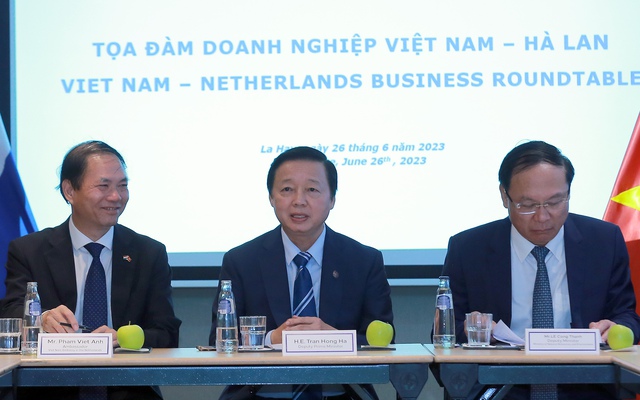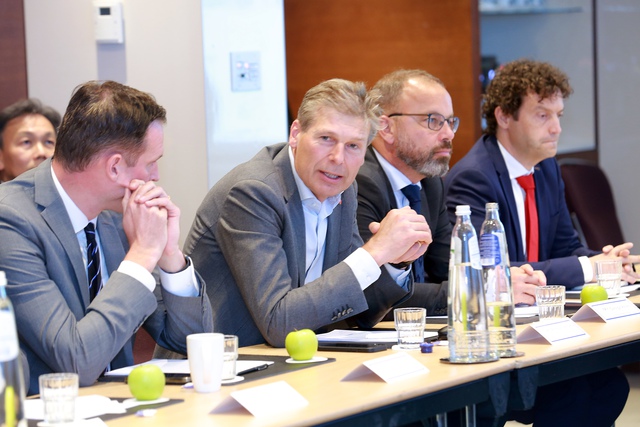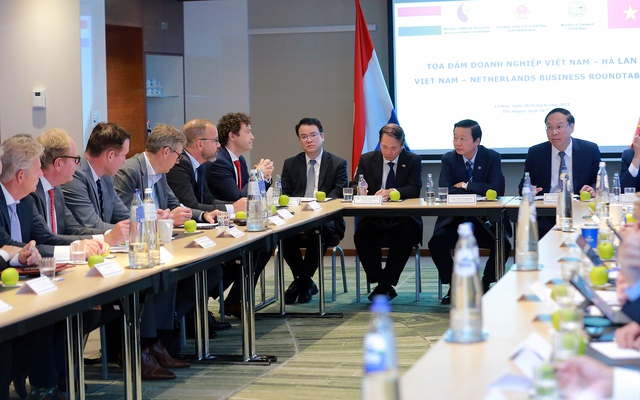Vietnam holds potential to become global hub for renewable energy
Representatives from Dutch corporations, including Van Oord, Royal Vopak, Pondera, Royal Boskalis, and De Heus, have expressed strong interest in investing in Vietnam.
The opportunity is open for Vietnam to emerge as a global renewable energy hub, facilitating the production and export of sustainable fuels such as green hydrogen and green ammonia.
| Deputy Prime Minister Tran Hong Ha at the roundtable. Photos: Minh Khoi |
Deputy Prime Minister Tran Hong Ha emphasized this view at the Vietnam-Netherlands Business Roundtable on June 26 as part of his visit to the Netherlands.
Nearly 30 large enterprises from the Netherlands and Vietnam attended the roundtable, representing a range of industries, including seaport infrastructure, mining, dredging, maritime services, logistics, renewable energy, and agriculture.
The Netherlands is Vietnam's second-largest trading partner in Europe and the largest investor from the European Union (EU). The two countries have identified five critical areas for development cooperation, including climate change adaptation and water management, agriculture, energy, maritime economy, and logistics services.
Looking back at 400 years of historical ties, when Dutch merchants engaged in business and trade in Vietnam, the Deputy Prime Minister expressed hope that the Vietnamese and Dutch business communities would discuss specific projects and areas of mutual economic potential and strengths.
| A representative of the Van Oord Group discusses the potential of projects related to an estuary and estuarine dredging and offshore sand mining. |
Recognizing the similarities between Vietnam and the Netherlands, such as breathtaking natural landscapes, hardworking and friendly people, and vulnerability to climate change and rising sea levels, the Deputy Prime Minister stressed the need for knowledge sharing and experience exchange based on the Dutch development model in disaster prevention, climate change adaptation, greenhouse gas emission reduction, and transition to a green economy.
"This is an opportunity for Dutch businesses to seek and establish effective investment and business projects in Vietnam," Ha said.
"Despite being a developing country, Vietnam has demonstrated a strong commitment to achieving net-zero greenhouse gas emissions, embarking on a green transition, and shifting from fossil fuels to renewable energy. The country has many pending projects, especially in the renewable energy sector, where it has the potential to become a global hub for the production and export of green fuels such as green hydrogen and green ammonia," he emphasized.
| Overview of the roundtable. |
Additionally, Vietnam's signing of 15 Free Trade Agreements (FTAs) with major economies around the world has brought significant benefits to investment projects of Dutch companies in the country.
Representatives of Dutch corporations, including Van Oord, Royal Vopak, Pondera, Royal Boskalis, and De Heus, have expressed strong interest in various projects such as coastal protection, offshore sand mining for construction and transport purposes, dredging of essential navigation channels, construction of liquefied gas ports, hydrogen and ammonia production, digitization of seaport information exchange processes, and development of closed livestock chains.
They also conveyed their desire for streamlined visa and visa extension procedures while seeking Government support to ensure domestic enterprises meet the standards and regulations outlined in the FTAs. This support would enable them to take advantage of the opportunities presented by these agreements.
During the discussions, the Deputy Prime Minister responded to several inquiries regarding the development plans for offshore wind power centers and their linkage to the production of green hydrogen and green ammonia through the Power Development Plan VIII.
Also discussed was technology transfer for the conversion of fossil energy sources to renewable energy and the exploration and use of sea sand as a construction material.
During the sidelines of the discussions, corporations such as Geleximco, Flamingo, and Saigon Newport expressed their high regard for the extensive experience, advanced technology, and capabilities of Dutch enterprises in sea sand exploitation, minimizing ecological impact during coastal development, dredging channels for seaport ships, implementing effective seaport management models, technical cooperation, smart port construction, and human resource training.
In light of these positive assessments, the Deputy Prime Minister encouraged direct collaboration between Dutch businesses and their Vietnamese counterparts, as well as ministries and sectors, to foster open exchanges, transparent sharing of ideas, and proposals for business investment cooperation. This collaborative approach aims to enhance business partnerships in the foreseeable future, thereby making significant contributions to promoting economic cooperation and investment between the two countries.















